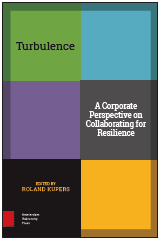The Resilience Action Initiative
Turbulence: A Corporate Perspective on Collaborating for Resilience

This 188-page publication presents the tools and concepts developed by the members of the Resilience Action Initiative to foster resilience in an increasingly turbulent world. Swiss Re contributed a full chapter focusing on enterprise resilience.
In 2013 and 2014 we partnered with other large, globally active companies in the Resilience Action Initiative (RAI). The premise of the initiative was that ever-greater demands on food, water and energy systems – in the context of climate change – will make the world a much more turbulent place in future. Putting a strong focus on practical action, the Resilience Action Initiative argued that our socio-economic systems will have to become more resilient to such turbulences – and then sought to explore how multinational companies can help to strengthen the adaptive capacity of their own operations as well as the communities they interact with and depend on.
Building on our substantial experience in helping communities to strengthen their risk resilience, our sustainability and emerging risk specialists developed a novel concept of enterprise resilience. This defines three levels of resilience:
- “structural”, focusing on the company’s own systemic nature;
- “integrative”, emphasising the company’s complex interconnections with its environment;
- “transformative”, highlighting the company’s ability to develop over time.
For each of these levels, the concept specifies a set of “resilience lenses”, which companies can employ to assess their current resilience against potential turbulences and identify appropriate adaptation measures.